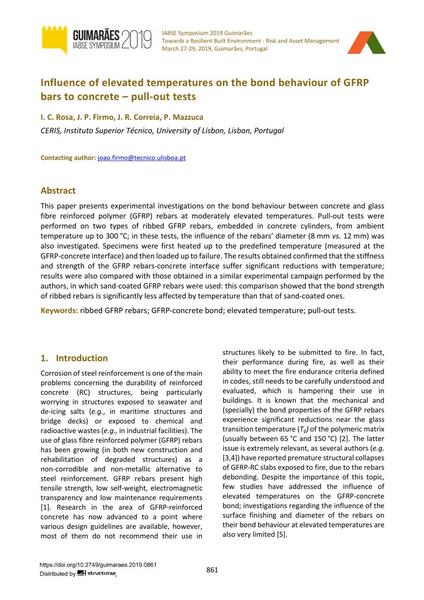Influence of elevated temperatures on the bond behaviour of GFRP bars to concrete – pull-out tests

|
|
|||||||||||
Bibliographic Details
| Author(s): |
Inês C. Rosa
(CERIS, Instituto Superior Técnico, University of Lisbon, Lisbon, Portugal)
João P. Firmo (CERIS, Instituto Superior Técnico, University of Lisbon, Lisbon, Portugal) João R. Correia (CERIS, Instituto Superior Técnico, University of Lisbon, Lisbon, Portugal) P. Mazzuca (CERIS, Instituto Superior Técnico, University of Lisbon, Lisbon, Portugal) |
||||
|---|---|---|---|---|---|
| Medium: | conference paper | ||||
| Language(s): | English | ||||
| Conference: | IABSE Symposium: Towards a Resilient Built Environment Risk and Asset Management, Guimarães, Portugal, 27-29 March 2019 | ||||
| Published in: | IABSE Symposium Guimarães 2019 | ||||
|
|||||
| Page(s): | 861-868 | ||||
| Total no. of pages: | 8 | ||||
| DOI: | 10.2749/guimaraes.2019.0861 | ||||
| Abstract: |
This paper presents experimental investigations on the bond behaviour between concrete and glass fibre reinforced polymer (GFRP) rebars at moderately elevated temperatures. Pull-out tests were performed on two types of ribbed GFRP rebars, embedded in concrete cylinders, from ambient temperature up to 300 °C; in these tests, the influence of the rebars’ diameter (8 mmvs.12 mm) was also investigated. Specimens were first heated up to the predefined temperature (measured at the GFRP-concrete interface) and then loaded up to failure. The results obtained confirmed that the stiffness and strength of the GFRP rebars-concrete interface suffer significant reductions with temperature; results were also compared with those obtained in a similar experimental campaign performed by the authors, in which sand-coated GFRP rebars were used: this comparison showed that the bond strength of ribbed rebars is significantly less affected by temperature than that of sand-coated ones. |
||||
| Keywords: |
elevated temperature pull-out tests ribbed GFRP rebars GFRP-concrete bond
|
||||
